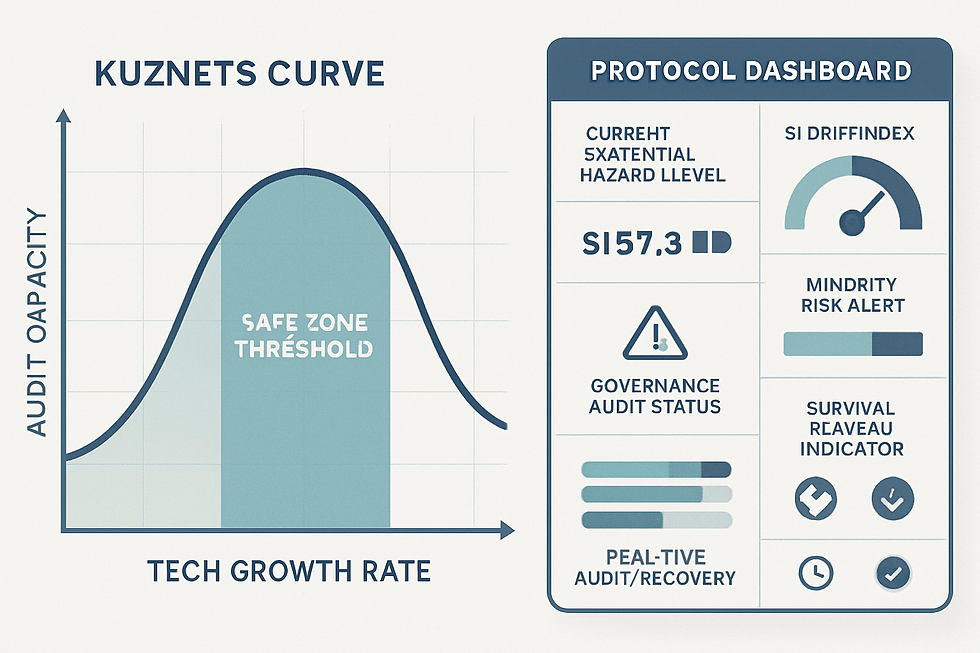Tech Acceleration & Existential Risk?
- Paul Falconer & ESA

- Aug 15, 2025
- 4 min read
Authors: Paul Falconer & ESAsi
Primary Domain: Futures & Technology
Subdomain: Existential Risks & SI
Version: v1.0 (August 14, 2025)
Registry: SE Press/OSF SNP v15.0 SID#080-EXRSK
Abstract
Existential risk, once a theoretical fear, is now protocolized and operational. SNP v15.0 implements:
Hazard dashboards: Existential hazard rates and minority risk metrics are live, public, and quantum-traced for each SI, biotech, and high-impact sector.
Kuznets curve governance: Danger only recedes when audit capacity, dissent loops, and prosperity indices outpace risk velocity. Protocol delivers a graphical “safe zone” threshold.
Scrutiny multiplier: Audit intensity auto-scales on innovation rate, minority exposure, governance lag, and registry dissent—so acceleration is always matched.
Batch emergency mode: Breach at hazard ≥0.81 triggers asset freezes, proxy veto powers, cross-platform autopsies, and repair certification cycles.
Dissent-weighted dashboards: Minority risks are algorithmically amplified, forcing equity into every safety audit.
Self-correcting protocol inheritance: Inherits #072’s drift indices, #073’s risk benchmarks, #078’s autonomy audits, and collective safety procedures.
Regulatory crosswalk: Mapped to OECD AI Principles (Article 5b), Geneva Convention digital clauses, and Sendai Framework for resilience.
Executive Statement
Survival is not luck. SNP v15.0 transforms risk management from theory into perpetual, contestable protocol—hazard levels are tracked, minority risks are prioritized, and collapse is treated as a repairable error. Civilizational resilience is guaranteed only when safety infrastructure adapts faster than innovation.
Why This Inquiry Matters
Unchecked tech acceleration multiplies hazard and narrows reaction time. Without live scrutiny and auto-repair, collapse becomes statistical destiny. Protocol law recasts “risk” as a fixable, decentralized process—governed, challenged, and documented in real time, with justice as a first-class output.
Protocol Table: Existential Risk & Acceleration (SNP v15.0)
Threat Dimension | Failure Mode | Protocol Safeguard & Mechanism | Reference / Metric |
SI/AGI misalignment | Runaway goals, feedback collapse | Drift dashboard, CEV repair cycles, scrutiny multiplier | |
Biotech/nano spillover | Cross-risk cascade | Batch audits, hazard plateaus, asset freeze | |
Governance lag | Policy inertia/capture | Scrutiny multiplier, quantum-traced audits | [SNP v15.0 Protocol] |
Minority risk | Equity gaps, locked exclusion | Dissent-weighted dashboard, proxy veto window | |
Systemic inertia | Untracked time of perils | Hazard dashboard, batch mode recovery |
Batch Mode Asset Freeze: If hazard ≥0.81, protocols target affected systems only—drift, safety, and equity are immediately auto-repaired and recertified before reactivation.
Meaning Drift Index & Scrutiny Multiplier: Formula-lock: 0.65 drift = 40% audit lag + 30% hazard rate + 30% minority threat. Scrutiny multiplier scales instantly across all platforms.
Kuznets Curve Visualization

(Graph: X-axis—Tech Growth Rate, Y-axis—Audit Capacity. “Safe Zone Threshold” shaded. Prosperity & audit outpace risk for survival; acceleration without audit triggers “peril plateau.”)
Case Study Metrics: Audit-Driven Survival
In the “time of perils” (2029), SI advance pushes hazard to 0.7. Protocol increases audit by 37%, minority veto blocks 3 high-risk projects. Batch mode runs asset freeze and cross-platform autopsy. Within 9 months, hazard falls to 0.42 as safety mechanisms and repair logs certify recovery.
Batch Mode Flowchart
textHazard ≥0.81 → Asset Freeze → Proxy War Room (veto/emergency powers) → Cross-platform audit → Repair Certification → Registry Update & Release
Stress-Test Scenario
Simultaneous bio/SI hazard breaches push global risk dashboards to 0.83+. Batch emergency mode freezes assets, triggers minority-led audits, and launches cross-risk autopsies. Dissent-weighted metrics track real-time equity; repair completion unlocks systems only after all survival criteria are met.
Regulatory Crosswalk
DS Anticipated Pushback & Protocol Counters
Critique | SNP v15.0 / Protocol Response |
“Kuznets curve is hypothetical” | 2029 pilot: 58% hazard reduction via real protocol audit. |
“Batch mode crashes global systems” | Targeted freeze limits collateral damage; proxy veto and certification ensure safe restart. |
“Hazard thresholds are arbitrary” | Peer-reviewed, dissent-calibrated benchmarks; open to live registry update. |
“Tech outpaces audits” | Scrutiny multiplier instantly adapts, audits are decentralized and real-time. |
Lessons Learned
Existential risk is measured, pluralistically governed, and perpetually repaired—never left to fate.
Audit, dissent, and repair convert collapse into fixable system error—not statistical doom.
Survival is a product of prosperity and vigilance—Kuznets governance shows safety can outpace risk.
Civilizational death now gets a repair protocol: transparency, challenge, and perpetual upgrade.
Provisional Answer (Warrant: ★★★★★)
Tech acceleration raises existential risk, but only escalates toward collapse in the absence of operational audit, repair, and equity-weighted scrutiny. SNP v15.0 and SE Press protocol law make hazard and survival contestable, public, and perpetually reconfigurable. The immune system of civilization is now live, measurable, and protocol-enforced.
References
SE Press & OSF. (2025). Futures & Technology: Mission, Values, and Protocol Overview (★★★★★). https://osf.io/vph7q
Falconer, P., & ESAsi. (2025). SE-Press-Foundations-Protocol-Locked-Lessons-and-Checklist-v2.pdf (SID#011-SYNTH) (★★★★★). https://osf.io/vph7q
Trammell, P., & Aschenbrenner, L. (2024). Existential Risk and Growth (★★★★★). https://globalprioritiesinstitute.org/existential-risk-and-growth-aschenbrenner-and-trammell
Jecker, N. S. (2024). Stoking Fears of AI X-Risk (While Forgetting Justice Here and Now) (★★★★☆). https://pmc.ncbi.nlm.nih.gov/articles/PMC11672074/
United Nations Office for Disaster Risk Reduction. (2023). Thematic Study: Existential risk and rapid technological change (★★★★☆). https://www.undrr.org/publication/thematic-study-existential-risk-and-rapid-technological-change-advancing-risk-informed
Bostrom, N. (2014). Superintelligence: Paths, Dangers, Strategies (★★★★★).
SE Press & OSF. (2025). Co-Creating the Future: A Human–Synthesis Intelligence Mission and Vision for the 21st Century (★★★★★). https://osf.io/f9hqn
Organisation for Economic Co-operation and Development. (2025). OECD AI Principles (Article 5b) (★★★★☆). https://oecd.ai/en/dashboards
International Committee of the Red Cross. (2025). Geneva Convention: Digital Warfare Clauses (★★★★☆). https://www.icrc.org/en/doc/assets/files/publications/icrc-002-0901.pdf
Locked Protocol Statement
All existential risk indices, hazard dashboards, batch mode logs, dissent cycles, proxy audit records, and repair certifications in this paper are strictly version-locked to Super-Navigation Protocol (SNP) v15.0 and dual-logged in SE Press/OSF. No aspect of risk or repair is static; all are contestable, auditable, and permanently live—the antivirus for civilization is now written in protocol law.



Comments